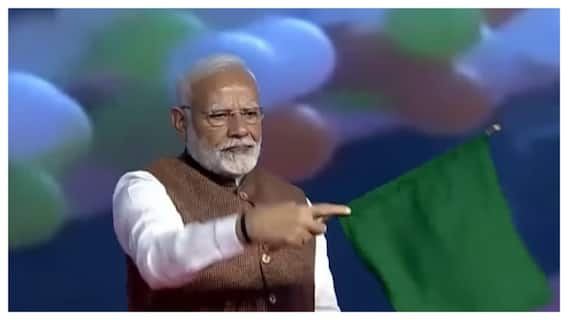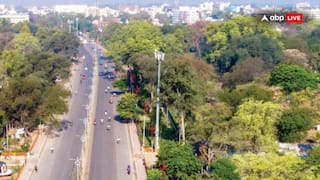Explorer
Advertisement
Decoding China's Instrument Of Deception On Pretext Of Military Posturing With Neighbours
Amid the growing stand-off between the two armies in the Ladakh region, let us explore some critical aspects which the 'Red Dragon' tries to conceal, nevertheless it is slowly but surely coming to the fore around the world.

(File Photo/ Getty)
Cornered, condemned, blemished and slighted, China faces an ever growing backlash from the world fraternity over its alleged involvement in deliberately spreading the COVID-19 virus, now even coined or termed as the 'Wuhan Virus' to all parts of the world. Over the past fortnight, the red hot news headlining the global defence landscape has been the heated escalations between Indian Army and Chinese (PLA) troops deployed along the Line of Actual Control (LAC) in the forward areas of the Ladakh region.
On the face of it, while the forced-on aggression by the Chinese seems to be yet another attempt to challenge and endanger India's territorial sovereignty, it is very much an age old tactic of stealth used by the Chinese to divert the world's attention from the titanic internal woes it wrestles with within a somewhat dictatorial regime, which reveals less and conceals more.
A look back into history would throw more light into China's divergent tactics at a time when an internal crisis of tectonic magnitude loomed large over the close guarded Communist regime. Many renowned strategic experts are of the firm opinion that Chinese Premier Mao Zedong used the 1962 war against India to cover up the massive Chinese famine due to failure of the 'Great Leap' Forward revolution.
Amid the growing stand-off between the two armies in the Ladakh region, let us explore some critical aspects which the 'Red Dragon' tries to conceal, nevertheless it is slowly but surely coming to the fore around the world.
The all conquering and unshakable Chinese Communist Party (CCP) is facing severe flak from its citizens who are pointing fingers at the ruling party for the worst possible economic downturn the nation has faced for half a century. The Chinese economy shrunk 6.8 percent in the first quarter of 2020 (Year-On-Year basis), its worst ever contraction since the 1960s..
China has been severely criticized from all quarters of the globe for bulldozing and infringing upon the sovereign rights of Hong Kong and Taiwan. Shocking images and videos of brutal assault of Chinese oppression levied on the Hong Kong protestors has further exposed their aggressiveness and totalitarian mindset .
With India along with and a whopping 130-odd UN member nations spearheading and passing a major resolution in the United Nations General Assembly to probe into the origin of the novel coronavirus and to carry out an "impartial, independent and comprehensive" evaluation, the 'Dragon' has been left red faced and fuming. It is resorting to revenge by stepping up the ante against its South Asian neighbour through scaling up troops and beefing up military assets along the Galwan river valley and Pangong Tso lake region of Ladakh.
It is a no brainer that the already weakened Communist party governed Nepalese government..out of nowhere.. claiming strategically important Indian territories of Lipulekh Pass and Kalapani via newly released maps seems to have been done at the behest of their Chinese Comrades. China in the past has used buffer states as a foreign policy instrument to level up or square off against their political rivals, without getting into direct confrontation mode.
In a nutshell, it finally comes down to a boiling question as to how much can China go up the escalation ladder against India from a strategic standpoint. The Chinese know for a fact that India is no longer a mere pushover ever since the 1962 Sino-India War and has considerably strengthened its defences along its eastern border, growing into a military power of noteworthy prowess which can repulse or thwart any misadventure.
It was not long back that the Indian Army stood its firm ground against the Chinese in what brewed up as an intense conflict around territorial occupation in the highly strategically located Doklam Plateau (northern tip of tri-junction of Sikkim, Bhutan and Tibet), sending out a very clear signal to China.
While China continues to exert its military dominance via deceptive naval deployments in the South China Sea as an apex predator, forcefully winning loyalties of economically marginalised Island nations much smaller in size and stature, they see India as possibly the lone major economic threat and military adversary in the Indian Ocean and the Asian continent.
China is prudent that after the United States and the ASEAN nations, India serves as one of their biggest export centres and consumption markets for their highly lucrative low cost goods (Indo-China trade pegged at around USD 70-75 bn). So any act of aggression or war could have severe economic ramifications and inflict a major cost to them. Stepping up the acceleration in the military ladder could at best be a full fledged conventional war specific to a region and not a nuclear war by any imagination, as both the Asian behemoths are nuclear powers and any non conventional warfare could lead to catastrophic effects on either side .
With an eye to eye and a fist for fist, the 'Red Dragon' and the sub continent 'Tiger' are once again at loggerheads at their borders .With ground level talks at even the formation commander level higher up the armed forces chain really not materializing to doze off the stand-off at Ladakh, could there be a political intervention through a diplomatic route to settle down the row? Till then, it could well possibly be a wait and watch game to see who takes the first step forward.
Follow Breaking News on ABP Live for more latest stories and trending topics. Watch breaking news and top headlines online on ABP News LIVE TV
View More
Advertisement
Trending News
Advertisement
Advertisement
Top Headlines
India
India
India
Cities
Advertisement


Sayantan Ghosh
Opinion






































